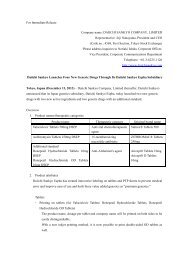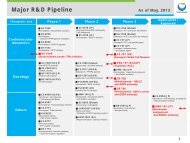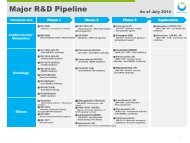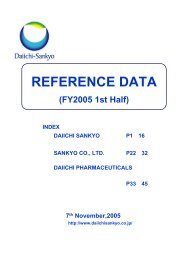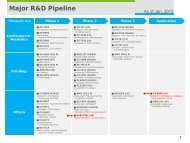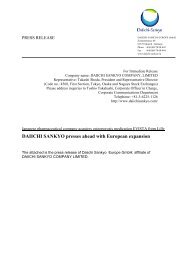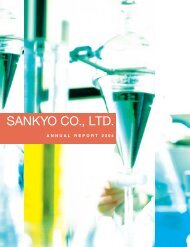Annual Report 2009 - Daiichi Sankyo
Annual Report 2009 - Daiichi Sankyo
Annual Report 2009 - Daiichi Sankyo
Create successful ePaper yourself
Turn your PDF publications into a flip-book with our unique Google optimized e-Paper software.
Accounting for Certain Lease Transactions<br />
Finance leases not transferring ownership were accounted for as operating leases with disclosures of certain “as if capitalized”<br />
information until March 31, 2008. From the fiscal year ended March 31, <strong>2009</strong>, as the Company has adopted the “Accounting<br />
Standard for Lease Transactions” (ASBJ Statement No. 13: originally published by the First Subcommittee of the Business<br />
Accounting Council on June 17, 1993 and later revised on March 30, 2007) and the “Guidance on Accounting Standard for<br />
Lease Transactions” (ASBJ Guidance No. 16: published by the Accounting Systems Committee of the Japanese Institute of<br />
Certified Public Accountants on January 18, 1994 and later revised on March 30, 2007), such leases are capitalized and depreciated<br />
over the estimated useful lives or lease terms, if applicable. However, such leases being effective prior to March 31, 2008<br />
continue to be accounted for as operating leases.<br />
This change has no effect on operating income, ordinary income or the loss before income taxes and minority interests.<br />
Amounts per Share<br />
In computing net income (loss) per share of common stock, the average number of shares issued during each fiscal year is<br />
used. For diluted net income per share, both net income and shares outstanding are adjusted to assume the exercise of stock<br />
warrants.<br />
Cash dividends per share represent actual amounts applicable to the respective years.<br />
Accounting Standard for Business Combination<br />
Effective from the fiscal year ended March 31, 2007, the Company has adopted the provisions of “Accounting Standard for<br />
Business Combination” (Corporate Accounting Deliberation Council; October 31, 2003), as well as “Accounting Standard for<br />
Business Separation (Corporate Accounting Standard No. 7; December 27, 2005) and the related “Implementation Guidelines<br />
on Accounting Standards for Business Combination and Business Separation” (Corporate Accounting Standard Implementation<br />
Guidelines No. 10; December 27, 2005).<br />
Practical Solution on Unification of Accounting Policies Applied to Foreign Subsidiaries<br />
As described in note 1, effective from the fiscal year ended March 31, <strong>2009</strong>, the Company has adopted PITF No. 18 “Practical<br />
Solution on Unification of Accounting Policies Applied to Foreign Subsidiaries for Consolidated Financial Statements” as published<br />
by the Accounting Standards Board of Japan (ASBJ) on May 17, 2006.<br />
PITF No. 18 requires that accounting policies and procedures applied by a parent company and its subsidiaries to similar<br />
transactions and events under similar circumstances should, in principle, be unified for the preparation of the consolidated<br />
financial statements. PITF No. 18, however, as a tentative measure, allows a parent company to prepare consolidated financial<br />
statements using foreign subsidiaries’ financial statements prepared in accordance with either International Financial <strong>Report</strong>ing<br />
Standards or U.S. generally accepted accounting principles. In this case, adjustments for the following six items are required in<br />
the consolidation process so that their impact on net income is accounted for in accordance with Japanese GAAP unless the<br />
impact is not material.<br />
(a) Goodwill not subject to amortization<br />
(b) Actuarial gains and losses of defined-benefit retirement plans recognized outside profit or loss<br />
(c) Capitalized expenditures for research and development activities<br />
(d) Fair value measurement of investment properties and revaluation of property, plant and equipment and intangible assets<br />
(e) Retrospective treatment of a change in accounting policies<br />
(f) Accounting for net income attributable to minority interests<br />
As a result of adopting PITF No. 18, operating income increased by ¥1,809 million ($18,459 thousand), and loss before<br />
income taxes and minority interests decreased by ¥1,865 million ($19,031 thousand).<br />
Reclassification<br />
Certain prior year amounts have been reclassified to conform to the current year’s presentation.<br />
These reclassifications have no impact on previously reported results of operations or retained earnings.<br />
52<br />
<strong>Daiichi</strong> <strong>Sankyo</strong> Co., Ltd. <strong>Annual</strong> <strong>Report</strong> <strong>2009</strong>



